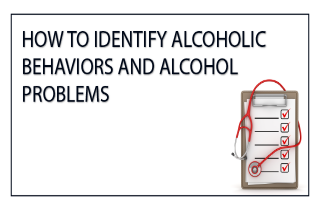Most alcoholics find it very difficult to stop drinking on their own. This is why alcohol treatment is usually the best way to achieve sobriety. So how can you identify addiction behaviors and intervene early? We review here. And then we invite your questions about alcohol problems and their treatment at the end.
Identifying alcoholic behaviors and alcohol problems
Alcohol problems can – and often do – lead to several problems, including family, financial, health and even legal problems. Catching and treating alcoholism early, on the other hand, can prevent many of these problems. Sober individuals, for instance, are generally healthier and have better relationships with their loved ones.
Identifying alcoholic behaviors and alcohol problems in others is often easier than identifying alcoholic behaviors and alcohol problems in oneself. You must approach this subject carefully, as most alcoholics may not be ready to admit that they have a problem. Even if alcohol is causing serious problems in their lives, many alcoholics will still be in denial.
How to tell if someone has an alcohol problem
Chances are you probably already recognize that someone may have an alcohol problem. The following list of classic behaviors and signs of an alcohol problem, though, can help confirm your suspicions.
- attempts to stop drinking have been unsuccessful in the past
- blackouts or memory lapses, particularly while drinking
- continuing to drink despite problems at home, work, or school
- drinking more or for a longer period of time than originally intended
- finding or making excuses to drink
- increased tolerance for alcohol
- legal troubles due to drinking
- neglecting responsibilities or activities in order to drink
- trying to hide drinking
So once you identify an alcohol problem, how can you confirm it? A doctor, psychiatrist, or licensed psychologist are generally able to diagnose an alcohol problem. In order to do so, a person will need to undergo a physical exam as well as answer a series of questions. This screening process generally involves questions about a person’s family history of drinking as well as questions about their own alcohol use.
Identify alcoholic behavior and alcohol problems…now what?
Realizing that you or your loved ones are struggling with alcohol problems can be very frightening. The good news, though, is that alcoholism is considered to be a disease, and like any disease, it can be treated. So, what’s the next step after identifying alcoholic behavior and alcohol problems?
1. First, it’s important to communicate with family and close friends and inform them of the situation. Chances are an alcoholic will find that the support of their loved ones will make the recovery process so much easier.
2. An alcoholic should then take steps to get into an alcohol recovery program. This usually starts with meeting with an addiction specialist, such as a psychologist or even the family doctor. Treatment is crucial for stopping alcoholic behavior. If you are worried it might be pricey, don’t forget that there are ways to pay for alcohol addiction treatment, without it costing a fortune.
3. If a person is not ready to admit that they have an alcohol problem, an intervention may be in order. During an intervention, an alcoholic’s loved ones will gather together and confront the person about their problem and how it affects them as well as everyone around them. A licensed addiction counselor may be present during an intervention to help keep it on track and try to convince the person to seek help.
Help for alcoholic behavior and alcohol problems questions
If you or a loved one need help for your alcohol problem, but still have questions, be sure to leave them in the comments section below. Your questions and concerns will be addressed as soon as possible. We strive to help all of our readers along every step of their journey toward sobriety.









Related Posts